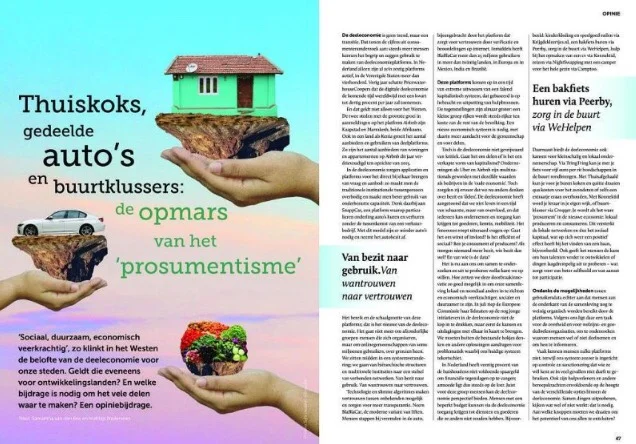A sharing city embraces and monitors the collaborative economy as a means to a more socially, sustainably and economically resilient city. Lately, Amsterdam has received a lot of attention for being a front-runner in monitoring, rather than banning, the sharing and collaborative economy in the city.[1][2][3][4][5][6] Very often, the collaborative and sharing economy is equaled exclusively to Airbnb and Uber, which are portrayed as very problematic for the city and its people. Every story has two sides, and although there are, and will be, challenges with any initiatives, there are also benefits and opportunities. Moreover, the collaborative economy has a much richer ecosystem beyond the typical examples of Uber and Airbnb. These two giants are making up a big part of the discussion, but surely, our scope has to be widened to include other platforms such as for example WeHelpen, Konnektid and Thuisafgehaald (Share your meal).
Read More“Exciting turn ahead” it must say on a traffic sign for those exploring the possible routes to the future of transportation. Technology is about to bring more opportunities for the way we move around than we had in the last century. Since the transition from horse carriages to the automobile changes have been evolutions, but no revolutions.
Now we are at the verge of a true revolution in transportation. Electrification has been slowly entering the market. Where public transport companies have been using electricity for a while, nearly all car manufacturers are now following. Tesla took it from ‘the good alternative’ to ‘the sexy alternative’ to a fossil fuel driven car.
Read MoreHoneycombhousing is a social/cultural-housing platform to connect international students with homeowners on peer-to-peer basis in Sweden. Sanne Toonen (founder of Honeycombhousing) explained: 'It’s the social aspect that makes the difference. It’s best described as 'Fika'. The Swedish expression for coffee breaks that’s more about socializing than drinking coffee. This Swedish tradition shaped Honeycombhousing to what it is today and sets them apart from other services in providing housing for international students.'
Read MoreIn this month's insights, you can read about:
- The launch of shareBE.
- Sharing Economy and Sustainable Tourism.
- The European Mobility Week kick off.
- Why people actually participate in the collaborative economy.
- The Green Deal day.
- Regulatory framework for the sharing economy.
- The Amsterdam Sharing City International Press trip.
And much more...
Read MoreThis meetup was a deep-dive into the future of the (collaborative) economy, and the future of society. While shareNL has been involved in the sharing/collaborative economy for quite some time now, the blockchain was a relatively new topic. With the aim of reshaping society, it was time to address the potential role of blockchain platform services in the current society. To answer the question of whether the blockchain will live up to its promise to enable a true peer-to-peer network, Pieter van den Glind (shareNL), Samantha van der Bos (shareNL), Perry Smit (Innovationlab of the Chamber of Commerce), Chris Huls (Rabobank), Jeroen Rijnbout (BITONIC), and Robert-Reinder Nederhoed (blandlord.com) provided us with insights into the possibilities of blockchain technology.
Read More“All the modern technologies have only let us work more, and work harder.” This is a popular statement these days, but they do not fit well with the actual numbers. Tools and machines have made us faster and stronger. Digital technologies have made us smarter and have let us communicate faster. Over time, technologies have dramatically increased our productivity. Today, we get more done in less time. Our output has increased both at the workplace and in the household.
Read More‘Social, sustainable and economically resilient’, that’s the promise of the sharing economy for our cities in the West. Is this also the case in developing countries? And what is needed to become a true sharing society? An opinion column.
Read MoreCities battle many challenges, and recourses are often scarce to address these. Born out of issues that cities face and combining it with the collaborative economy, is what we like to call the Sharing City. Why should your city start using sharing to your advantage and work towards becoming a sharing city?
Read MoreThis year, the team at shareNL contributed to a research project by the JRC namely the ‘The future of the EU collaborative economy – 'Using scenarios to explore future implications for employment’. Now, the European Commission released the ‘JRC Science for policy report’, and we summarize the highlights here. For full report, click here. The report emphasizes the importance of acknowledging both opportunities and challenges that this new economy brings and suggests concrete areas and issues that need to be considered in order to foster continued growth of the collaborative economy.
Read MoreAmsterdam and Airbnb today announced a new pioneering agreement to promote responsible and sustainable home sharing and combat illegal hotels. Amsterdam was one of the first cities in the world to introduce a progressive and innovative policy towards home sharing while ensuring that homes remain homes. Under these rules, Amsterdam citizens are allowed to share the home in which they live for a period of 60 days per year. Read more...
Read MoreLast week our Flemish Samantha, who has a soft G pronunciation and Dutch Ananda with a typical Dutch hard G pronunciation travelled from Groningen in the North of the Netherlands to Gent in Belgium together. They set out on their journey to share knowledge in these two cities with each their own identity. Read more...
Read MoreGuestblog by Niels Baljet, TU Delft
Eight-hundred-eighty-one
That’s the number of things I own. An obsession of stuff is what kick-started my graduation project at the Faculty of Architecture at the TU Delft. Several bloggers, photographers and artist, such as Peter Menzel and Judith de Leeuw, are questioning whether we are living in a material world. Inspired by them, I decided to count everything I own. With mathematical precision I transformed my home into a photo studio, capturing and counting everything I have. Well, 881 is the answer. It sure seems like a lot. If I would display everything on the floor, it would occupy an area of 120 square meters. The combined volume of these items would be 52 cubic meters. That’s the volume of two vans. Is it really necessary to own so many things? And why do I even want to own more things? At the moment I finished this experiment it was already out-dated, since I bought more stuff. And I want to own even more. In extend to the sheer amount of stuff in our households, it seems we are all having more or less the same things. Could sharing be the solution to this redundancy of things? Can we promote a shared habitat where you live with less while having access to more? Read more...
By Yue Jik Chu and Lies van den Eijnden
The NRC Live Deeleconomie event last week gave a good opportunity to become fully immersed in the collaborative economy: especially for newcomers. Read the key take-aways (and check out the pictures!) here.
Read MorePrivate lease is een enorme groeimarkt, in het afgelopen jaar steeg het aantal private leaseauto's van 36.000 naar 50.000, een stijging van 35% in slechts zes maanden. Het wordt dus voor de particulier steeds populairder om een auto te leasen in plaats van aan te schaffen. Dit past ook helemaal in het tijdsbeeld, waarbij consumenten liever niet de lasten van bezit willen dragen. Met private lease heb je toegang tot een eigen auto, een recent en zuinig model en betaal je een all-in prijs per maand. Contracten worden steeds korter en als je leasetijd voorbij is, lever je gewoon je auto weer in en kies je evt. een nieuwe. Read more...
Read MoreIn Amsterdam (Amsterdam, Netherlands) more than 180.000 people are supported by social security and welfare (almost 1 out of 5 people). Though, they are not the ones who are taking most advantage of the opportunities the sharing economy brings. The local government is looking into how to address this issue by enabling access to sharing platforms with the local city pass. Yesterday at 'Dit is pas Amsterdam' at Pakhuis de Zwijger we spoke about how to encourage an inclusive growth of the sharing economy, thus how to provide access to all goods and services through the sharing economy for people who could benefit the most. Read more...
Read MoreDoor: Bram de Vrind Er liggen voor ondernemers volop kansen in de snelgroeiende deeleconomie, bleek woensdag bij de MKB Innovatie Top 100. "Er zijn al initiatieven waarbij je je hond kunt delen met de buurman."
Cabaretier Dolf Jansen interviewde onder andere Harmen van Sprang (ShareNL) en Daan Weddepohl (Peerby) over dit nieuwe fenomeen, waarbij het draait om het gebruik in plaats van bezit van spullen. Bedrijven maken het bijvoorbeeld met apps mogelijk om spullen tegen vergoeding te lenen of uit te lenen.
Read more...
Read MoreDoor: Philip Bueters Consumenten zijn dol op de sharing economy. Ruim twee derde ziet het wel zitten om eigendommen te verhuren aan anderen, blijkt uit een studie van Nielsen.
Jazeker: 68 procent van de 30.000 consumenten die Nielsen in 60 landen heeft ondervraagd, hechten niet zo erg aan hun spullen, dat ze deze niet willen delen met anderen - liefst voor geld natuurlijk. En ongeveer evenveel mensen zou ook wel zaken van anderen willen lenen of huren. Airbnb, Snappcar of Peerby; wij hebben inmiddels keuze genoeg.
Read more...
Read MoreDoor: Hans Pieters – Metro 29 april 2014
Het wittefietsenplan uit de jaren ’60 ging nog ten onder aan ordinaire diefstal. Maar dankzij het internet en slimme innovatie wordt bezit meer en meer ‘old skool’.
Waarom veel geld uitgeven als het zoveel goedkoper kan? Volgens trendmaker en industrieel ontwerper Daan Roosegaarde is bezit passé en delen in. Een overzicht van slimme initiatieven waarmee je auto en andere bezittingen de deur uit kunnen. En de zaken waar je op moet letten.
Read more...
Read More













